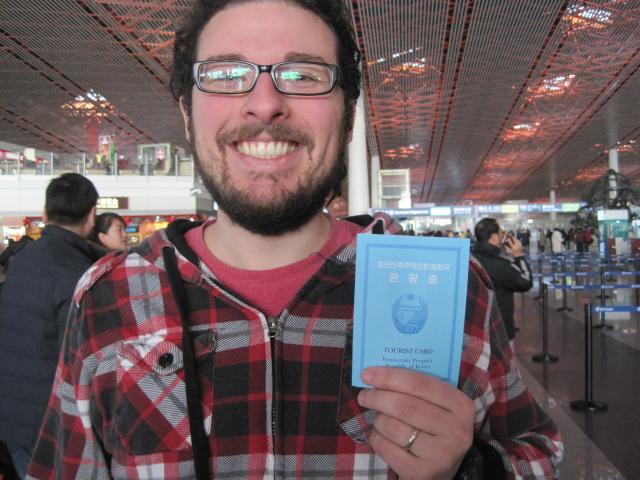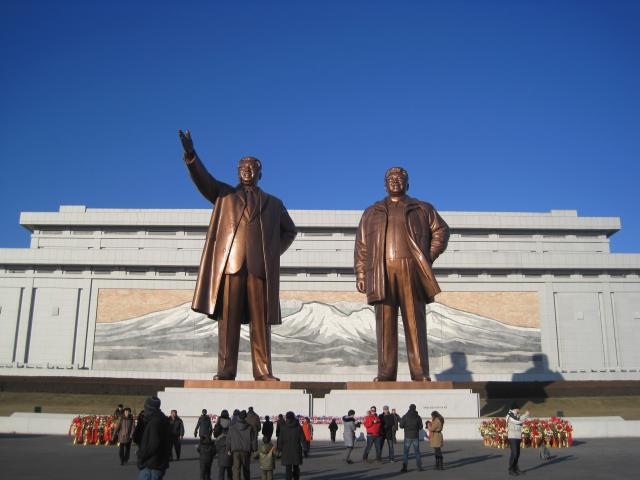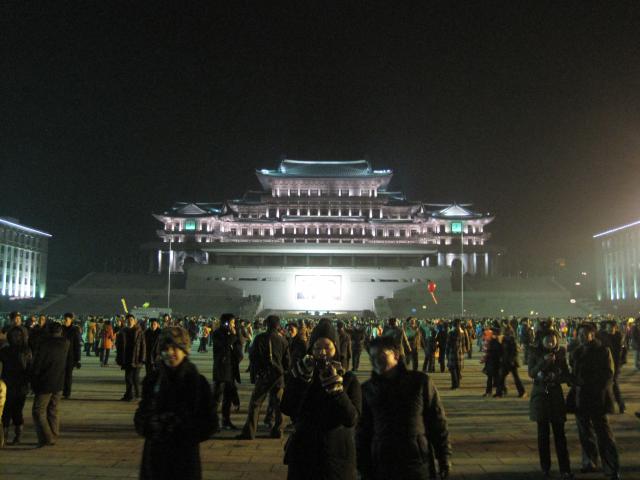Tourist Says Visit to North Korea was 'Like Being on Mars'
For more on what life is like inside North Korea, watch Jared Brock's interview with CBN's Sr. International Reporter George Thomas
Jared Brock got a rare opportunity to visit North Korea as a tourist in 2014.
"It was like being on Mars," Brock told CBN News during an interview. "It's like nothing I've experienced in my entire life."
Like American Otto Warmbier, who died this week shortly after being released from North Korea, Brock was part of tour group granted permission to celebrate New Year's in the communist nation.

(Credit: Jared Brock)
But Brock said his five-day experience of traveling to the hermit kingdom was totally foreign.
"It was like stepping into a time capsule from 1953."
His adventure there was part of a 37,000-mile journey that took him to 12 countries around the world.
He documented his travels in the book A Year of Living Prayerfully.
"I was writing this book on prayer and I wanted to visit the most dangerous place on earth for Christians and it has been rated as such for more than a decade."

(Credit: Jared Brock)
He said the communist propaganda started the moment he landed in the capital city of Pyongyang.
"As soon as we landed at the airport, they {authorities} took away my passport," Brock recalled.

(Credit: Jared Brock)
He was assigned a tour guide, but Brock knew this 'guide' was only there for one and only reason: To spy on him.
"He {guide} was with me the entire time; If I used the urinal, he would either stand at the urinal beside me or he'd wash his hands."

(Credit: Jared Brock)
Asked how the world can pray for North Korea, Brock replied:
"Pray that they would meet Jesus in dreams and visions, through supernatural means {and} the underground church in North Korea would explode."
Brock wrote about his North Korean experience in a 2014 piece for Esquire.
Here is an excerpt from that article:
"Welcome to the Democratic People's Republic of Korea," our host beamed. The plane had barely landed, and the propaganda had already started. I was officially part of the first tourist delegation to ever visit North Korea for New Year's. Over the next five days, I'd be under 24-hour surveillance, and I'd be hearing all sorts of interesting "facts."
"What is the first thing you notice?" my guide asked.
"Ummm…" He didn't give me time to answer.
"The fresh air. Do you love all the fresh air?!" I sniffed for a second. All I smelled was jet fuel and diesel fumes.
"Well, I…" I stammered. "I think you very much like the fresh air," he nodded.
For the next 20 minutes, I was the captive audience for a lesson on the virtues of North Korean air quality. In reality, the only reason that North Korean air is decently clean is because they simply do not have any meaningful industrial output. This would not be mentioned at any point in my time abroad. It would be the first of many subtle twistings that I'd have to endure in the next few days.
"We arrived at our hotel, which was a ghost town. Over 40 stories high, and only three rooms rented. Half the elevators didn't work, and when the doors opened on my floor, the hallway was dark.
"Why aren't there any lights?" I asked the guide. "We are conserving energy, eco and friendly!" he proclaimed.
"I think you like your room very much," he said as he opened my door. "Five stars!" I scanned the Cold War-era decor, complete with a turn-knob radio. Three stars, generously. After checking in, we re-boarded the bus to go for dinner.
"Do you notice," the guide said excitedly, "No traffic!" He neglected to mention that only high-ranking party faithful are allowed to lease or own cars, nor that the average citizen (such as himself) could afford a vehicle even if they saved for a decade.
"Do you also see," he continued, "there are no billboards or advertising? Very nice. I think you like." The reason, again, is elementary -- there aren't any stores. Aside from a few grocery and clothing depots, including one called "Department Store #1" (there is no #2), there's not much to buy, and people don't have much to spend.
"You can take pictures, maximum 10, with our permission," one of the guides instructed. I took 289 photos in total, but none of the really interesting things. Like the child laborers we witnessed in the fields. Or the folks outside the capital, hand-drawing water from mud-lined wells. Or the troops of teenaged female soldiers. We were forbidden from photographing a broken-down bus, but encouraged to photograph a brand new one, just a few seconds later.
With each place we visited -- the brand new swimming complex, the brand new equestrian center, the brand new daycare facility -- the concluding question was always the same: "What is your impression?" The real meaning was almost immediately apparent: "Is it better than yours?"
We visited a brand new housing complex, built expressly for 1,000 party-faithful engineers, complete with a bird-chirping soundtrack on the kid's playground. As we toured the various apartment models, the guides made sure to ask us the same question each time: "How much this house cost where you live?"
We'd reply with various amounts, the guide would translate, and the local family would nod in grave consternation. Sure, our houses aren't free in the west, but they come with nice little extras like pride of ownership and freedom of expression.
I caught on pretty quickly. I wasn't going to give in so easily. Whenever we'd complete an activity, the guide would inevitably say, "What is your impression?"
My reply was always the same: "It was good."



